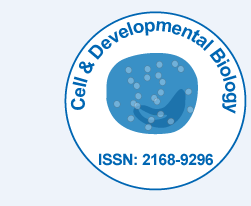
Cell & Developmental Biology
Open Access
ISSN: 2168-9296

ISSN: 2168-9296
Alexander E Berezin
The “obesity paradox” phenomenon is referred to as a U-shaped curve between long-term prognosis and body mass index in heart failure patients. There is a large body of evidence regarding the regulatory role of visceral adipose tissue-related adipocytokines in activity of endogenous repair system. The reparation of myocardium and endothelium may strongly enhance by differentiation and mobbing of endothelial progenitor cells (EPCs). They improve angiogenesis and collateral vessel growth, as well as counteract vascular injury. It has suggested that several metabolic factors frequently associated with HF may increase the number of circulating EPCs, which mediate repair processes and collaborate with obese. In contrast, decreased number and/or weak functionality of EPCs relate with altered endogenous repair system and may negatively contribute in HF development. Finally, moving across recently received evidence “obesity paradox” could be elucidated as a result of interplaying of trigging repair systems and ability of EPCs to response on challenges enhancing reparative potency in target organs, i.e. myocardium, vascular wall and endothelium.